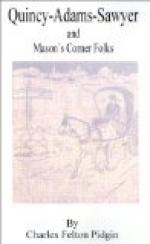Leaving the State House on the Hancock Avenue side, he walked down that narrow but convenient thoroughfare, and was standing at its entrance to the sidewalk on Beacon Street, debating which publisher he would call on first, when a cheery voice said, “Hello, Sawyer.” When he looked up he saw an old Latin School and college chum, named Leopold Ernst. Ernst was a Jew, but he had been one of the smartest and most popular of the boys in school and of the men at Harvard.
“What are you up to?” asked Ernst.
“Living on my small fortune and my father’s bounty,” said Quincy. “Not a very creditable record, I know, but my health has not been very good, and I have been resting for a couple of months in the country.”
“Not much going on in the country at this time of the year I fancy,” remarked Ernst.
“That’s where you are wrong,” said Quincy. “There has been the devil to pay ever since I landed in the town, and I’ve got mixed up in so many complications that I don’t expect to get back to town before next Christmas. But what are you doing, Ernst?”
“Oh, I am in for literature; not the kind that consists in going round with a notebook and prying into people’s business, with a hope one day of becoming an editor, and working twenty hours out of the twenty-four each day. Not a bit of it, I am reader for ——;” and he mentioned the name of a large publishing house. “I have my own hours and a comfortable salary. I sit like Solomon upon the efforts of callow authors and the productions of ripened genius. Sometimes I discover a diamond in the rough, and introduce a new star to the literary firmament; and at other times I cut up some egotistical old writer, who thinks anything he turns out will be sure to please the public.”
“How fortunate that I have met you?” said Quincy. “I have in this little carpet bag the first effusions of one of those callow authors of whom you spoke. She is poor, beautiful, and blind.”
“Don’t try to trade on my sympathies, old boy,” said Ernst. “No person who is poor has any right to become an author. It takes too long in these days to make a hit, and the poor author is bound to die before the hit comes. The ‘beautiful’ gag don’t work with me at all. The best authors are homelier than sin and it’s a pity that their pictures are ever published. As regards the ‘blind’ part, that may be an advantage, for dictating relieves one of the drudgery of writing one’s self, and gives one a chance for a fuller play of one’s fancies than if tied to a piece of wood, a scratchy pen, and a bottle of thick ink.”
“Then you won’t look at them,” said Quincy.




